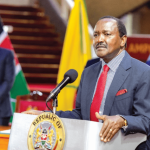Despite the increasing urgency of climate change, a large number of Kenyans remain uninformed about its implications. The main reason for this is a significant lack of information.
In response to this challenge and to encourage public engagement, the Kenya Alliance for Resident Associations (KARA) has launched a detailed Citizen Handbook on Climate Change. This handbook is designed to simplify complex climate information, making it easier for the general public to understand and act upon.
“The main purpose of this book is to tell the climate change story from a scientific to a social reality. It also hopes to fight misinformation, communicate local and not globally, develop new climate narratives, and connect with what our audience cares about,” said Henry Ochieng, the KARA CEO.
Global warming
The handbook provides in-depth coverage of the science behind global warming, offering a thorough explanation of the increase in global temperatures. It highlights human activities, such as widespread fossil fuel usage, which releases significant amounts of carbon dioxide into the atmosphere.
Specifically, the handbook details how activities like transportation (including aircraft, ships, vehicles, and trains), manufacturing, oil drilling, waste disposal, agriculture, and energy generation contribute to these negative effects. Additionally, it addresses the roles of deforestation, industry, forest fires, energy consumption, and cooking in exacerbating rising temperatures.
Detailed information
It also focuses on the specific effects of climate change on Kenya, from water supply to wildlife and livestock, tree cover to food production providing detailed information on specific challenges caused by global warming, including impacts on agriculture and diminishing water supplies.
“The handbook we are launching today is more than just a book, it is a tool for empowerment and action. It seeks to empower every citizen with knowledge and practical steps to contribute meaningfully to the fight against climate change. Whether you are a student, parent, business owner, or policymaker, this handbook equips you with information and resources to make informed decisions and take concrete actions,” said Richard Nyaga, Chairman of the Association, at the inaugural event.
KARA aims to empower individuals with information so they can take proactive steps to reduce local contributions to greenhouse gas emissions that are warming the environment. Their goal includes educating Kenyans on how to respond to the effects of climate change such as droughts, floods, erratic weather patterns, and damage to wetlands.
Ochieng emphasizes that climate change is not merely an environmental issue but a multifaceted crisis impacting health, agriculture, infrastructure, and the economy. However, many Kenyans lack access to comprehensive information about these impacts, which limits their understanding of the issue and consequently reduces their motivation to take action.
“Climate change is one of the greatest challenges of our time,” Ochieng declared. “Its effects are profound, affecting our environment, economies, and the well-being of every living being on this planet. Addressing this challenge requires urgent and collective action from individuals, communities, and nations.”
Jim Oduor, Executive Director of Climate Care Africa, highlighted from their recent study that while there is a high awareness of climate change among Kenyans, few recognize its severity or understand how their actions can mitigate its impacts. Personal concern remains relatively low, indicating a need for deeper education and engagement on the issue.
“Most respondents felt that they were not very informed about matters concerning climate change and made a strong call for more information, more public awareness a great percentage are ready to learn and receive information regarding climate change adaptation and mitigation,” said Oduor.
According to him, the handbook comes at an opportune time as it explains the impact of citizens’ actions or inactions on climate change, how citizens can be involved in climate-friendly and environmental conservation activities, and where to get information on climate change.



